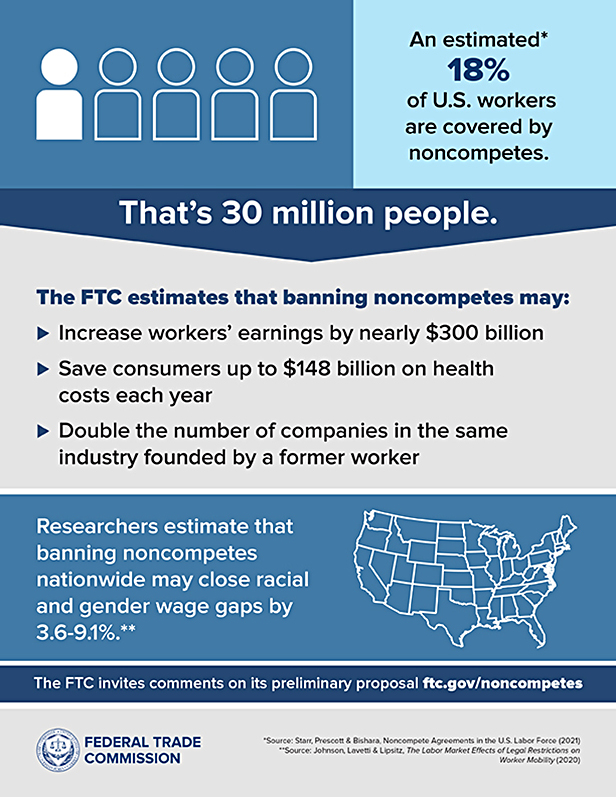February 08, 2024
FTC Final Ruling on Proposed Ban of Noncompete Agreements Looms
The potential outlawing of noncompete clauses for essentially all workers in the United States has proved a divisive prospect in promo and far beyond.
The future of noncompete agreements in the United States could be decided within a couple months’ time.
The Federal Trade Commission is eyeing April as the month when it will issue a final rule on a proposal introduced last year that would, if enacted as written, broadly prohibit noncompetes in the United States.
The final rule could differ in particulars from what the FTC began considering in 2023. Still, as proposed, the regulation would prohibit employers from inserting noncompete clauses into contracts with essentially all workers – and from in any way representing that a worker is subject to a noncompete.

Varying Views in Promo
A noncompete clause essentially prohibits one party (a worker) from taking another job or starting a business in a similar profession and/or region that competes against another party (the employer).
The prospect of stamping out noncompetes has proved a divisive and controversial one in the promotional products industry. Some promo pros say the clauses handcuff workers, preventing them from advancing their careers, restricting entrepreneurship and, in extreme cases, depriving them of a livelihood.
An FTC-proposed ban on noncompetes is sharply dividing opinion in the #promoproducts industry. This special report has everything you need to know about the proposal and how industry pros are reacting to it.https://t.co/zU00xcMuWJ@ASI_MBell @Tim_Andrews_ASI @asicentral
— Chris Ruvo (@ChrisR_ASI) February 17, 2023
Others say noncompete clauses help an owner protect their business, which includes investment in employees and clients. The contract clauses bulwark business owners from unscrupulous workers who would take what they learn at the employer’s firms and then leverage it to propel their own success elsewhere – either by establishing their own business or going to work for a competitor, according to proponents of noncompete agreements.
Big Business Opposition
Some in big business think the FTC’s proposed ban should be sent to the scrap heap.
The Intellectual Property Owners Association, a trade group that includes Google, Apple, Exxon, Nike and Pfizer, came out against the potential ban.
“In the experience of IPO’s members, noncompete clauses are a legitimate and important tool organizations use to protect trade secrets and confidential information, which are vital to the nation’s economy and security,” the organization wrote in a letter to the FTC.
Meanwhile, SIFMA, a trade organization for the securities industry whose board includes executives from financial industry heavyweights like Goldman Sachs, Bank of America and Morgan Stanley, is opposed to the FTC outlawing noncompete clauses across the U.S.
“The near-categorical prohibition on noncompete clauses will hurt competition and the economy,” SIFMA wrote in a comment letter.
‘Un-American & Uncompetitive’
Still, FTC Chair Lina Khan has asserted that the majority of the approximately 27,000 comments the FTC received during a public comment period have been in favor of an across-the-board prohibition on noncompete clauses. “We take that very seriously,” Khan said.
Comments are reviewable in full online.
One commenter, Jeff Thayer, told the FTC, “I fully support the plan to make noncompete agreements illegal in the workplace. They have caused much harm for many decades and should never have been allowed to be legal in the first place! Talk about un-American and uncompetitive!”
Commenter James Keenan said: “I support eliminating noncompete clauses. They increase income inequality. They are a tool for making workers poorer and adding to the wealth of those who are obscenely wealthy.”
The FTC’s Impetus
When introducing its proposed ban, the FTC said that noncompetes constitute an unfair method of discouraging competition that violates Section 5 of the Federal Trade Commission Act.

“The freedom to change jobs is core to economic liberty and to a competitive, thriving economy,” Khan said. “Noncompetes block workers from freely switching jobs, depriving them of higher wages and better working conditions, and depriving businesses of a talent pool that they need to build and expand.”
According to Economic Policy Institute research from 2019, almost half of employers nationwide have some employees on noncompetes. Between 28% and 46.5% of all private sector workers are subject to some form of a noncompete, according to EPI.
The FTC estimates 18% of all workers are under noncompetes. The trade regulators say that by halting the practice of noncompetes, wages will rise by $300 billion annually across the United States’ economy. Career opportunities would expand for about 30 million Americans too, according to the FTC.
Likely Legal Challenges
It’s possible that the FTC could elect to tone down the intensity or scope of prohibitions on noncompetes.
David Fisher, a labor and employment partner at Davis+Gilbert, told CNBC the regulators could take a page from Massachusetts and Oregon, which require employers to compensate former workers while those people are subject to the company’s noncompete after employment has ended. The FTC also could possibly allow some level of noncompete to exist but limit things to a particular timeframe, such as a year or 18 months, as some states do.
“There are many ways they could craft this rule to recognize the value that noncompete agreements bring ... while at the same time protecting employees subject to them and their ability to earn a living and protect their families,” Fisher told CNBC.
“Protracted litigation challenging the commission’s authority to engage in this ruling making is inevitable.”From analysis by the law firm Butzel.
The FTC has given no indication that it’s prepared to back down from the sweeping ban on noncompetes proposed last year. If the commission were to approve such a prohibition, it’s almost certain that legal challenges would follow. Those could delay implementation of the rule as courts weigh the cases.
“Protracted litigation challenging the commission’s authority to engage in this ruling making is inevitable,” opine Sarah L. Nirenberg and Rebecca S. Davies of the law firm Butzel.
What Must Companies Do If the Ban Goes On the Books?
Since a final rule hasn’t been issued yet, it’s not clearly known exactly what obligations there would be for businesses under any new FTC restrictions on noncompetes.
Under the rule as it was proposed last year, noncompetes would become invalid with a broad range of “workers,” which are defined as employees, including senior-level executives, as well as independent contractors, consultants, interns and volunteers. Certain legal analysts say that the rule could apply even to partnership and membership agreements among individuals, meaning standard noncompetition clauses within LLC and partnership agreements could be affected.
If the prohibition comes to bear as it was initially proposed, employers would have to rescind noncompete clauses with current and former workers within 180 days of the rule taking effect. After rescinding, employers would have another 45 days to inform workers/former workers, through a specific communication to each, that the clause has been rescinded.
Some employment law experts say that even if noncompetes were banned nationally by the FTC, employers could still use other binding measures, such as non-solicitation agreements and nondisclosure agreements, to prevent former workers from leveraging a business’ proprietary information or pilfering customers and intellectual capital. Certain promo firms already make use of such options. Top 40 distributor Stran & Company (asi/337725), for instance, utilizes non-solicitation agreements.
“Secrecy options may involve limiting or carefully securing access to sensitive data and information and bolstering confidentiality agreements,” according to Forbes. “Some firms even find ways to personalize information they share with employees, so that they can quickly track down and punish the source of a leak.”
Another dynamic to note? The marketplace value of skilled/experienced workers may increase if the FTC ban takes effect, as companies strive to hang onto prized workers that would now have more employment mobility. “Eliminating NCAs is likely to cause salary readjustments,” Corrine Post, a professor of management and the Fred J. Springer Endowed Chair in Business Leadership at Villanova School of Business, wrote for Forbes.
There’s not currently a universal federal standard on noncompetes. Things vary from state to state, but most impose what authorities generally term as reasonable restrictions on noncompetes, such as limiting scope, duration and the type of restrictions allowed. California, North Dakota and Oklahoma do not allow noncompetes within their borders.